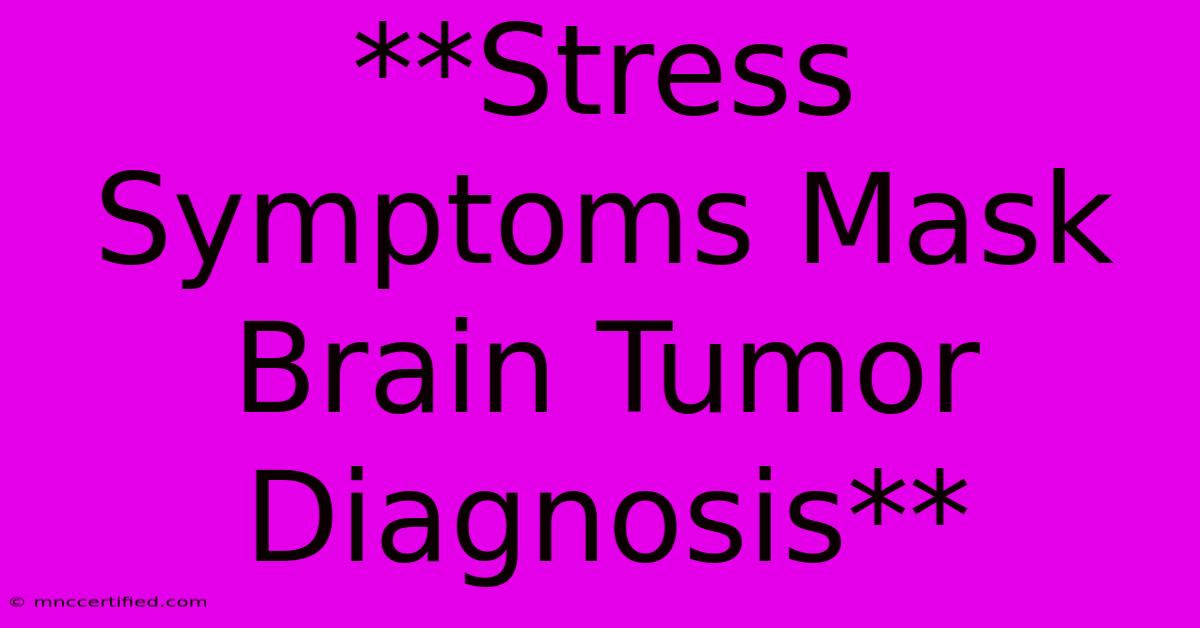**Stress Symptoms Mask Brain Tumor Diagnosis**

Table of Contents
Stress Symptoms Mask Brain Tumor Diagnosis: What You Need to Know
Stress is a common part of life, and its symptoms can be incredibly varied and difficult to pinpoint. However, sometimes these symptoms can be a red herring, masking a more serious underlying condition. One such condition that can mimic stress is a brain tumor.
This article explores the potential overlap between stress symptoms and brain tumor signs, shedding light on the importance of seeking medical attention when experiencing persistent or unusual symptoms.
The Deceptive Mimicry: Stress vs. Brain Tumor
Stress and brain tumors share a number of common symptoms, making it easy to mistake one for the other. These include:
- Headaches: While stress headaches are usually temporary and can be relieved with medication, brain tumor headaches often worsen over time, are more severe, and may occur in the morning or wake you up at night.
- Fatigue: Feeling tired and run down is a classic symptom of stress. However, fatigue caused by a brain tumor can be more persistent and debilitating, impacting your ability to function throughout the day.
- Cognitive Changes: Brain fog, difficulty concentrating, and memory problems are common side effects of stress. However, these symptoms can also be caused by a brain tumor, which can disrupt brain function.
- Mood Swings: Stress can lead to irritability, anxiety, and depression. Brain tumors can also impact mood and emotional regulation, causing similar changes.
- Nausea and Vomiting: While stress can lead to nausea and vomiting, these symptoms can also be a sign of increased intracranial pressure, a complication of brain tumors.
The key difference lies in the persistence and severity of these symptoms. If you're experiencing any of these symptoms regularly and they don't improve with stress management techniques, it's crucial to seek medical attention.
Why Seeking Medical Attention is Crucial
Ignoring these symptoms can have serious consequences. Early diagnosis and treatment of brain tumors can significantly improve outcomes.
Here's why it's vital to see a doctor if you suspect a brain tumor:
- Accurate Diagnosis: A medical professional can conduct tests like an MRI or CT scan to confirm or rule out a brain tumor, providing you with a clear diagnosis and treatment plan.
- Effective Treatment: Depending on the type and location of the tumor, treatment options can range from surgery to radiation therapy and chemotherapy. Early intervention can improve the effectiveness of treatment and increase the chances of a full recovery.
- Preventing Complications: Delaying treatment can lead to increased intracranial pressure, seizures, and other complications that can worsen your condition and impact your quality of life.
Taking Charge of Your Health
While stress is a common issue, it's crucial to be aware of the potential for more serious underlying conditions.
Here are some steps you can take to protect your health:
- Pay attention to your body: Be mindful of your physical and mental health. If you experience any unusual or persistent symptoms, don't ignore them.
- Consult a doctor: If you're concerned about your health, schedule an appointment with your primary care physician. They can assess your symptoms and recommend further tests if necessary.
- Practice stress management: While stress may not always be the cause of your symptoms, it's important to manage your stress levels through techniques like meditation, exercise, and relaxation techniques.
- Educate yourself: Learn about the signs and symptoms of brain tumors and other serious conditions. This knowledge can empower you to take proactive steps towards your health.
Your health is your most valuable asset. Don't let stress mask the signs of a potentially serious condition. By paying attention to your body, seeking medical attention when necessary, and taking proactive steps towards your health, you can significantly improve your chances of early diagnosis and successful treatment.

Thank you for visiting our website wich cover about **Stress Symptoms Mask Brain Tumor Diagnosis**. We hope the information provided has been useful to you. Feel free to contact us if you have any questions or need further assistance. See you next time and dont miss to bookmark.
Featured Posts
-
Bhad Bhabie Reveals Cancer Explains Weight Change
Nov 09, 2024
-
Property Damage Insurance Claim Lawyer
Nov 09, 2024
-
Retinal Imaging Cost Without Insurance
Nov 09, 2024
-
Amsterdam Attack Israeli Football Fans Ambushed
Nov 09, 2024
-
Talladega Insurance Agency Talladega Al
Nov 09, 2024